Florida Poly has a 31% 4-year graduation rate, Florida's worst, according to U.S. News
FPU has a 47% *6-year* rate, also Florida's worst, says the Florida Board of Governors. And FPU is about to start forcing kids to actually pay to attend. No wonder president Randy Avent bailed.
Images may cause this article to truncate in email. Please click through to the actual site if you need to.
The return on taxpayer investment for Florida Polytechnic University is far, far worse than even I realized in my last article.
Nepo-baby former state Sen. J.D. Alexander, R-Lake Wales strong-armed Florida Poly into existence more than a decade ago — against the wishes of the Lakeland/Polk community. We had long sought a stand-alone, full service campus of one of the existing state universities.
The orphaned, independent STEM college Alexander delivered instead is tiny and 80 percent male. FPU is the only public college in Florida where less than half the students graduate within six years. Moreover, taxpayers pick up more of the tab for those Poly students who don’t graduate than they do for students any other public college in Florida.
All of this information is readily available from public and official sources. The fact that nobody except me — who does not care what happens to Florida Poly — has ever discussed any of this in public says all you need to know about the deep unseriousness of the people who created and now lead this failcollege.
It also dishonors the handful or professors and students who have apparently built some strong, if small, STEM programs. I sympathize with those folks, who are toiling as best they can in good faith can under the constraints of incompetent leadership. They deserve better. It’s pretty ridiculous that I’m the first one to say it.
About that U.S. News thing …
Where to start? Well, how about U.S. News and World Report’s famously scammy college rankings? It is the first reference you see on the Florida Poly website.
What you do not see on the Poly website is this U.S. News summary of Poly’s 4-year graduation rate — 31 percent. This image is taken right from Poly’s U.S. News page:
This is the worst 4-yr graduation rate of any public college or university in Florida by 4 percentage points, according to U.S. News. I’ll leave it to U.S. News to explain how a 31% graduation rate, which is the worst in Florida, earns you “#1 Public College in Southeast US.”
I’ll just be over here laughing.
But if you’re gonna brag about U.S. News, Poly, on your site, then you should post this chart, too. I put this together using all the U.S. News 4-year graduation rates for Florida colleges and universities. You’ll note that FSU’s graduation rate is more than twice Poly’s.
Poly performs even worse in 6-year grad rate — where it is the only Florida public college under 50 percent
For those of you wondering if Florida Poly’s rigorous STEM curriculum means kids just need a little more time, FPU actually performs worse in the 6-year graduation metric, relative to other colleges, than it does in 4-year.
It’s the worst in Florida by 6 percentage points. It’s the only public college below 50 percent.
(Interestingly, Florida A&M improves markedly from 4-yr to 6-yr, almost doubling its grad rate to 59%, which is consistent with all but the very highest Florida college grad rates. It really stands out compared to other schools in its 4-to-6-yr improvement. That would be a fascinating dynamic to study. And I do think a 6-year metric is the fairest for colleges. Four-year just tends to measure the capital of your student body, I suspect.)
The 6-year data comes the annual state “Accountability Plan” each college submits to the Florida Board of Governors. See Poly’s plan at the link.
I used U.S. News for the 4-year data because Florida Poly likes to brag about its U.S. News standing. A sharp-eyed reader might notice that the 4-year grad rates in the annual state “Accountability Plans” are slightly higher than what U.S. News reports.
U.S. News and the Florida Board of Governors can fight over why. I don’t care. I tend not to believe grad rates as literal numbers, anyway. Lots of room for mischief.
Relative numbers are more telling; and Florida Poly is clearly Florida’s worst.
*We’re small; but you probably won’t graduate* is an incoherent, doomed business model
Florida Poly is now marketing itself as “distinctively small” on the U.S. News site. See this ad. “Distinctively” here suggests an intentional strategy.
Yet Poly was never sold to the Polk County public and taxpayer as “distinctively small.” And for good reason. Small doesn’t really help Polk kids, writ large. And it doesn’t make for much of an economic engine. Those were the two purposes for creating the standalone Lakeland college before anybody ever heard of “Poly” as an idea.
Poly is also not particularly selective, according to U.S. News. It accepts 47 percent of applicants, which is right in the middle of Florida colleges. And the applicants are not academically elite on paper, as this data from the accountability plan shows:
Only 31 percent graduated in the top 10 percent of their high school class.
That probably contributes to the low graduation rates. By most accounts I’ve read and heard, the actual technical instruction program is pretty rigorous for the minority of kids who complete it. There are smart professors and kids working at FPU; but I would bet Poly is admitting lots of kids who are poorly prepared for it — and thus can’t handle it. This is compounded by the isolation and lack of campus culture and support.
There is no case to be made for a public college that is both “distinctively small” and low graduation rate. That’s the worst possible value model for a public institution.
If you are “distinctively small” — and you only graduate 31 to 47 percent of your kids, who don’t pay anyway — it’s hard to see how that ever becomes cost effective for the taxpayers who make that model possible. It’s politically and fiscally doomed.
Poly could double down on selectivity and get way smaller and better for the kids who attend. That would likely help graduation rates. But again, does that serve a useful public function that justifies the expense?
And how do you get bigger when your applicant pool continually struggles to graduate — even in the “distinctively small” model — and your college community is 80 percent male.
Moreover, when you look at the trendlines on male and female degree attainment at Poly shown below, it seems like a no-brainer to bring more women into the college. (Men are aqua, women purple.)
That chart comes from Poly’s ‘21-22 “students achievement metrics” report, which is dated January 2022. I could not find one for ‘22-23.
“… Institution-based aid will need to decline in order to balance budgets”
If you read Poly’s Accountability Plan, you may notice these three bullet points of commentary concerning key performance metrics — which are average cost the student over four years, 4-yr graduation rate, and academic progress rate, respectively.
Not great for any of them. Academic progress = “significant uncertainty.” LOL.
But let’s look closer at “average cost to the student,” which I highlighted in red. This is the “sticker price” of the college, minus financial aid, etc. Note the negative cost numbers for Poly.
That means the average kid has not been paying to attend Poly. Financial aid, grants, COVID money etc. have been picking up the tab. Compare those cost numbers to, say, Florida Gulf Coast University, which you can see has zero “negative” numbers.
It’s the same for virtually every other Florida college.
I will admit this entire category is sort of confusing. The BoG does not explain it well, nor does Poly. But look at the gap between the -$13,610 average cost of 21-22 and the $5,000 “approved goal” average cost for 22-23. That’s an $18,600 delta.
Poly appears to be begging the BoG to change the goal to keep it in negative territory for years to come. But the commentary on this metric, from Poly itself, is pretty clear. Note the part in bold.
Realign the goals to more closely reflect our aid level, noting that in coming years the institution-based aid will need to decline in order to balance budgets.
Florida Poly itself is warning everyone that its internal gravy train is ending. You will have to pay much more in the future to attend this college that has no campus life and a graduation rate between 31 and 47 percent. How will that affect enrollment?
I think you can see why Randy Avent decided to get out while the getting was good.
Will Kelli Stargel save seven students for Poly by resigning from her fake job? Or will Poly make her president?
If former Republican state senator Kelli Stargel resigned from her fake job, for which we taxpayers cough up at least $130,000 per year, we might save Florida Poly for seven kids who can’t pay. That’s $130k divided by $18,600.
You can read all about Kelli’s lucrative role and largely empty work calendar here. It’s quite funny if you don’t care about Poly.
Kelli seems to have expanded her title and reach since I wrote that article. She’s now the “director of office of public policy events” as well as senior advisor for strategic relationships. She now has staff for her fake job.
I really, really, really hope Poly’s presidential search committee picks Kelli as next FPU president. At least one connected GOP media grifter has been floating that idea.
I am sooooo here for it.
It would enjoy narrating the collapse of J.D. Alexander’s ego on her watch.
No. local. bailout. Let it live or die on its own.
On a more serious note, the impending need to cut institutional aid to “balance the budget” seems likely to send Kelli or whoever gets picked as president hat-in-hand to the same local governments that got grifted into coughing up $26 million to create this situation in the first place.
Under no circumstances should any local government reward Poly’s abysmal leadership now for its total failure to build a coherent institutional model or seriously confront a single strategic problem.
Again: they. hired. Kelli. It tells you all you need to know about their seriousness and worthiness for public help.
The nepos and “leaders” who brought you the Florida Poly farce — the Alexanders, the McKeels, the Stargels, etc. — are the same people who have spent a generation complaining about and trying to damage/kill public education. They’re the same nepos and leaders who brought you Trump and will line up silently behind him yet again, like submissive automatons, even after Jan. 6.
Poly reveals what they’re capable of producing. Nothing. It lays bare their abject incompetence when they’re put in charge of anything.
So don’t come talk to me or the Lakeland/Polk public now, leaders and nepos, about saving your embarrassing college from your own indifference and grift and incompetence.
Fix it yourself if you can.




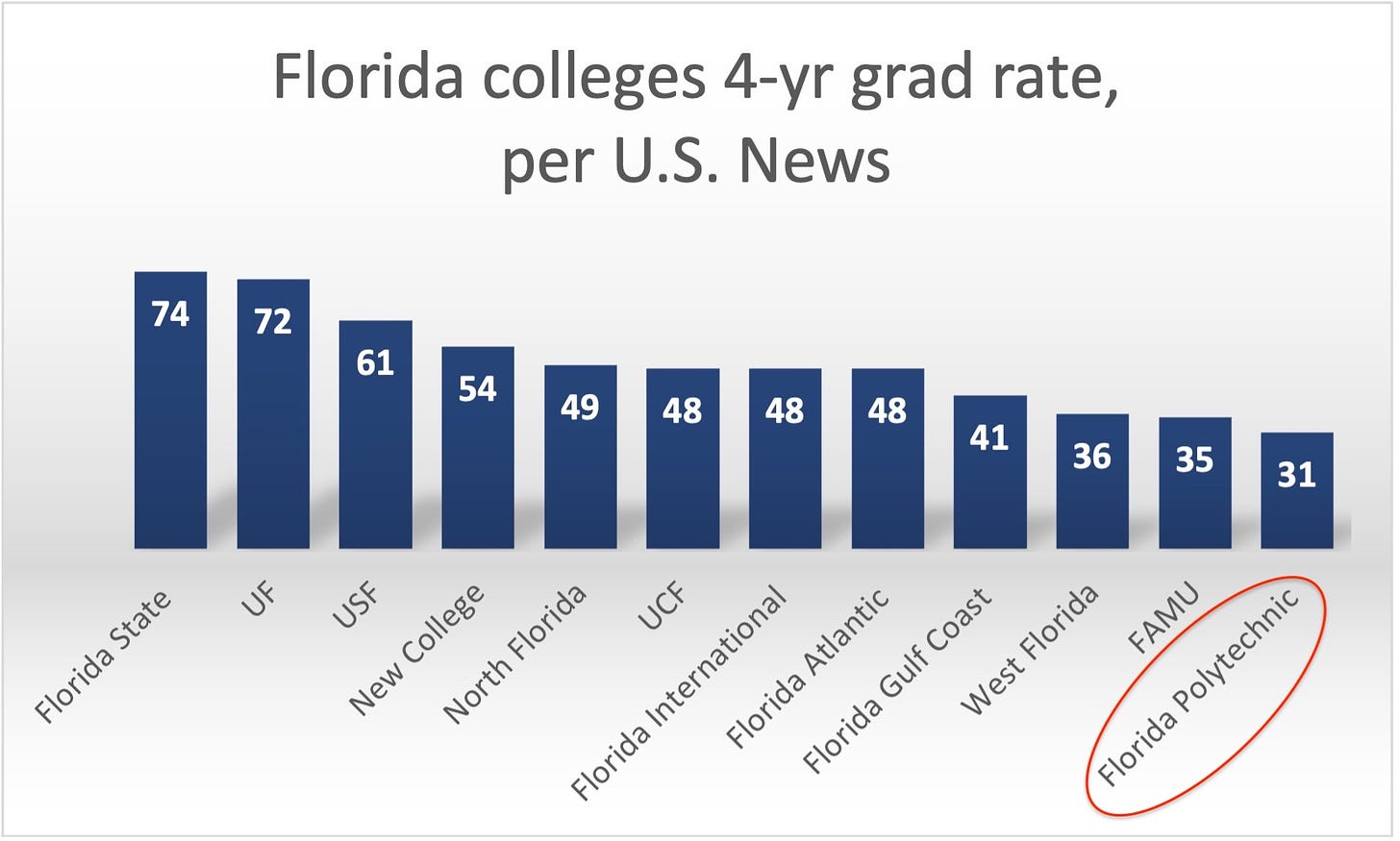
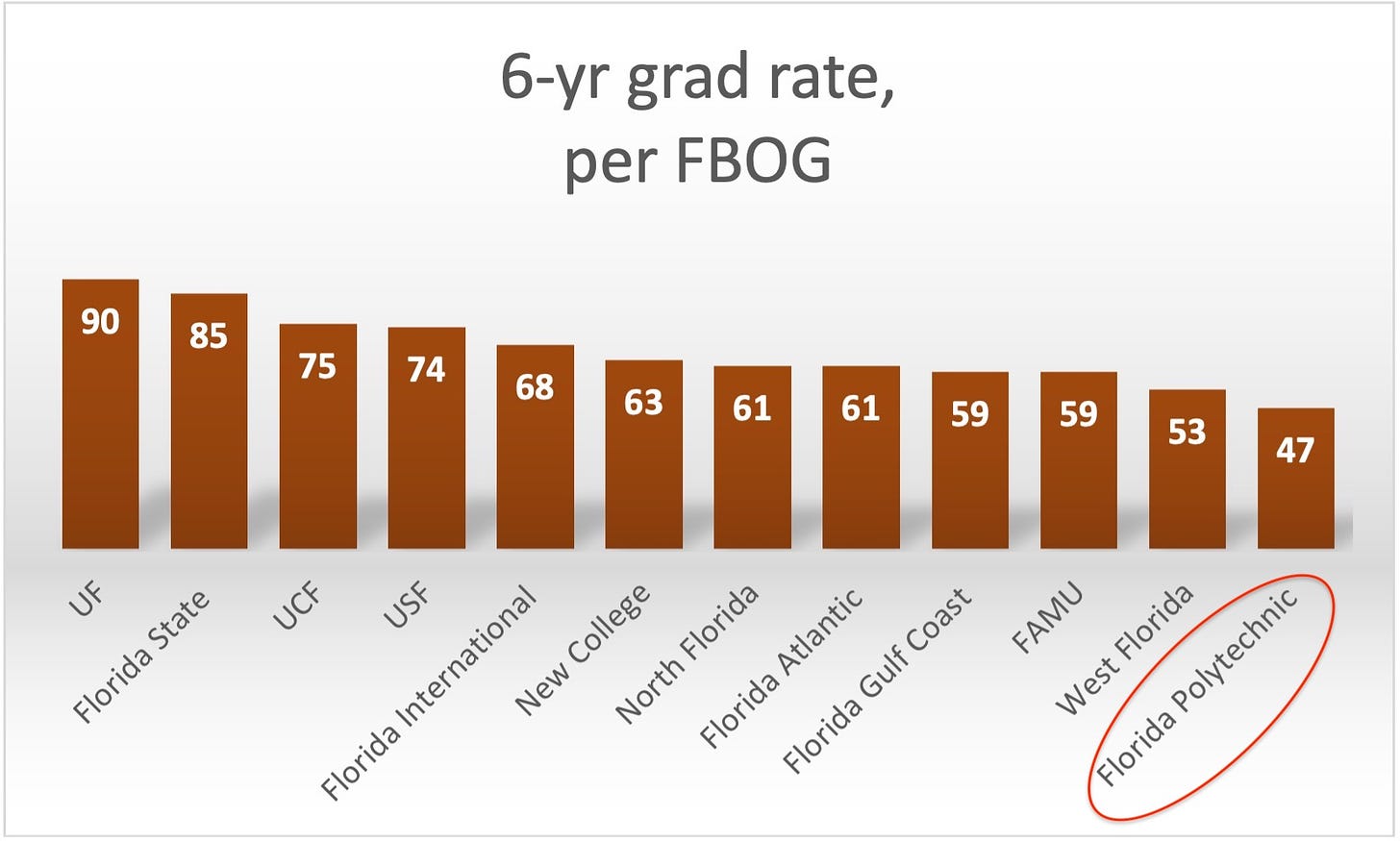

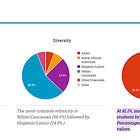
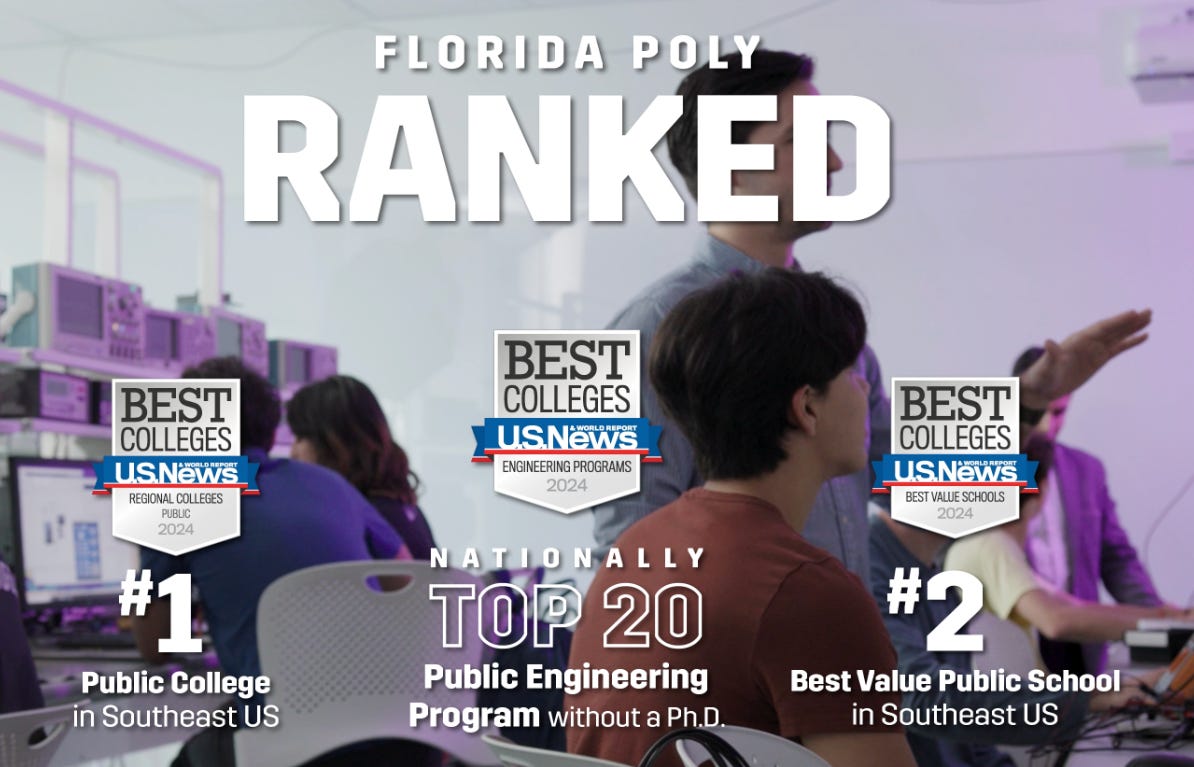
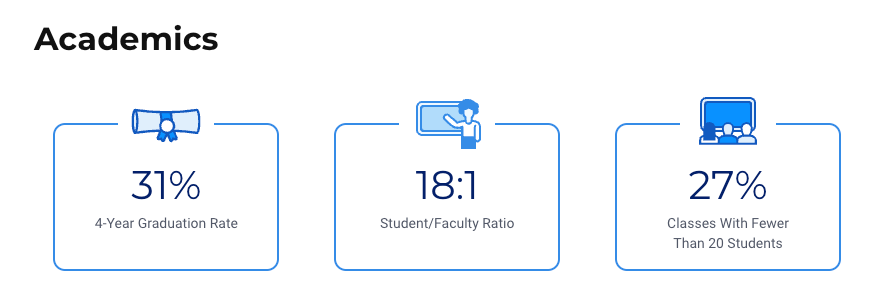
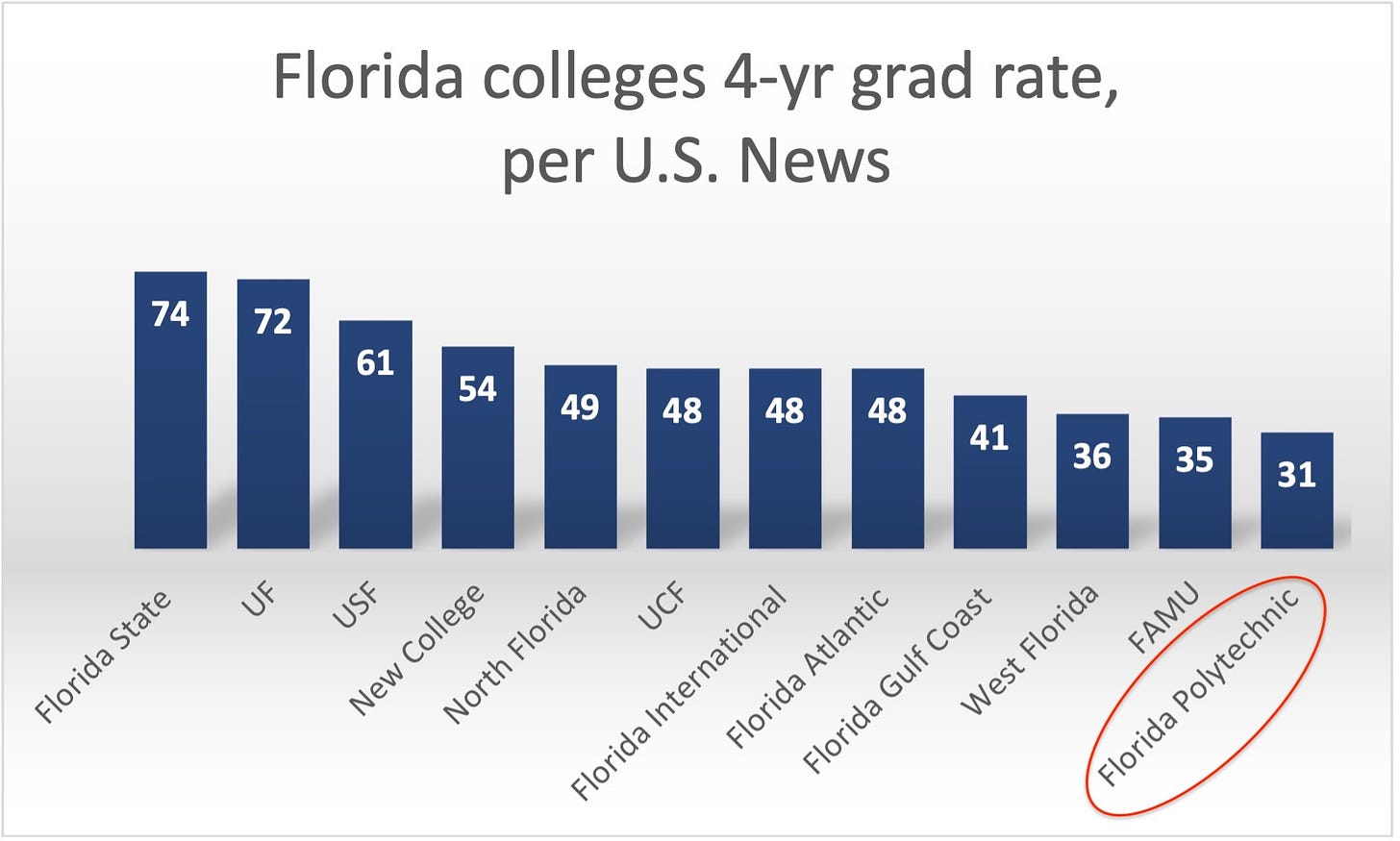
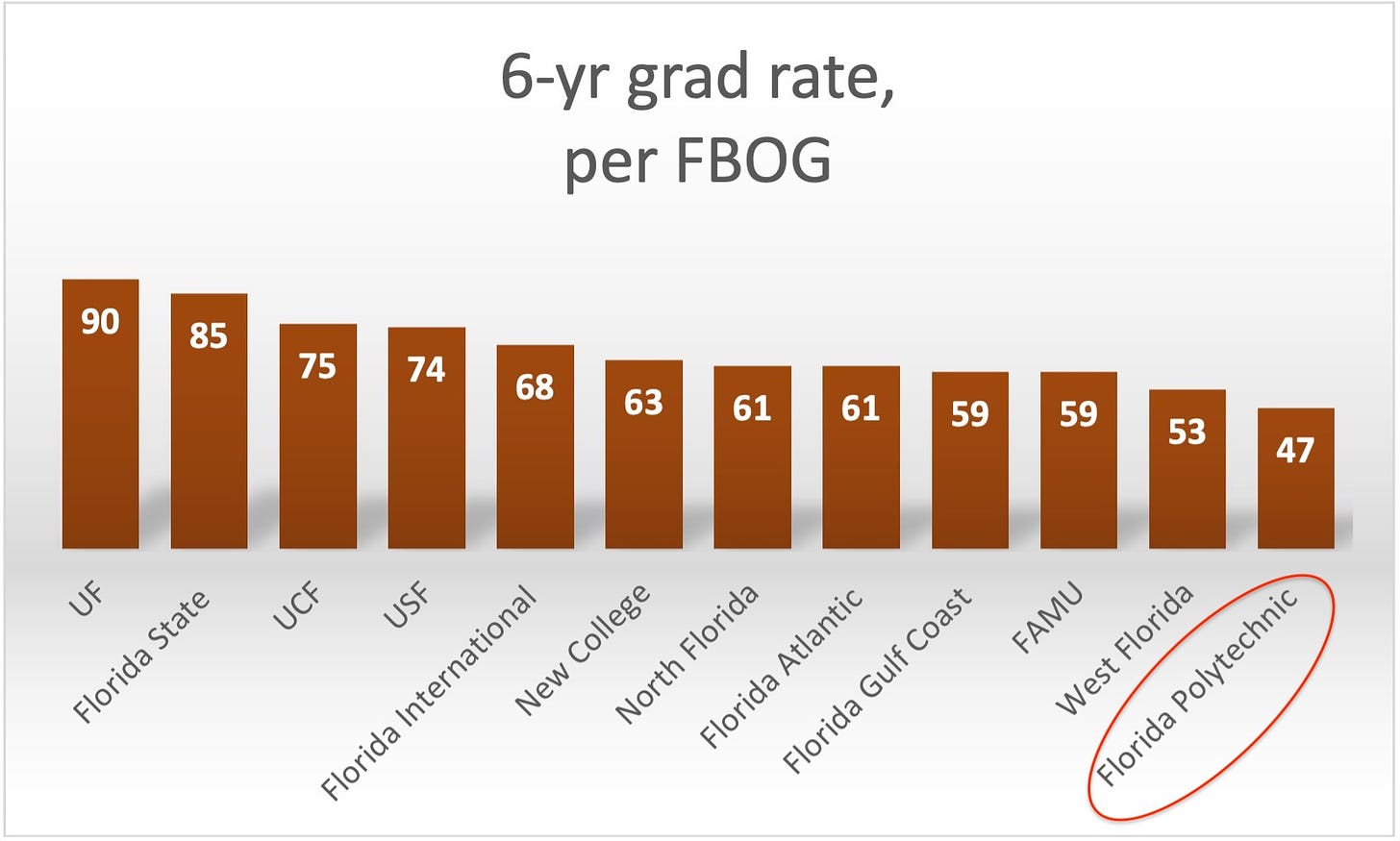
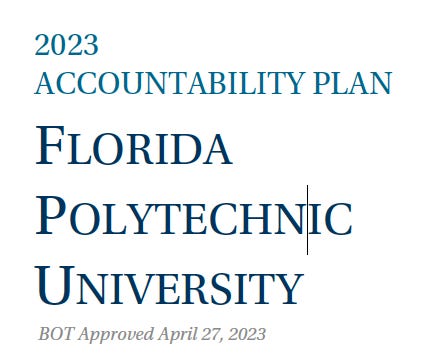


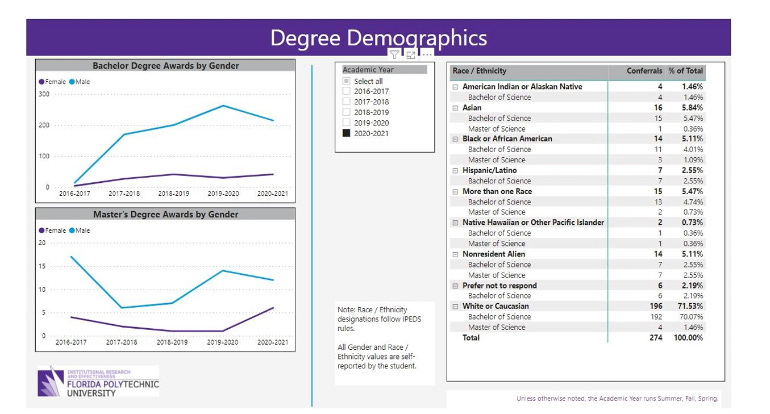







This is a pure STEM school with rigorous standards. Why would anyone compare it to schools with more diverse programs without ABET accreditation? Compare it with other STEM programs who care enough about their students to make sure they are employable after graduation.